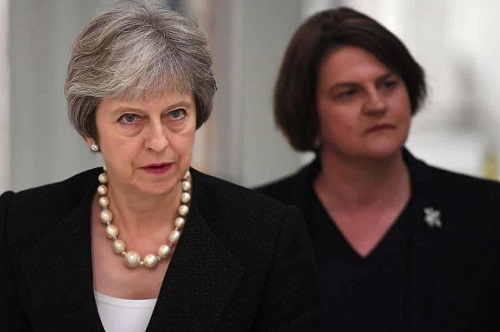flickr photo
By
Tom Arms
The British government, the Brexit process and parliament are being held to ransom by ten MPs who represent a narrow sectarian community who since the 17th century have used every dirty trick imaginable to cling to their precarious political perch in Northern Ireland.
The Democratic Unionist Party (DUP) could care less about the rest of Britain. In fact, they don’t even consider the majority of the Northern Ireland electorate, who voted to remain in the EU.
Every political decision that they make is judged through the prism of the Protestant Ascendancy and political separation from Catholic Southern Ireland. That is best achieved through the tightest possible links with mainland Britain on the other side of the Irish Sea. The EU—and specifically Theresa May’s Withdrawal Agreement—threatens those links.
The tale is an old one. The English have been in and out of Ireland since Norman times, but in the 17th century the battle for dominance in Ireland was injected with an incurable religious virus. England broke with Rome and Ireland remained steadfastly loyal to the Vatican. Protestant England now had a God-given right to conquer Ireland and the Catholic Irish didn’t help by supporting anyone who opposed the Protestant cause in England and Scotland. After a series of successive military victories, the English concluded that the best way to maintain political power in their troublesome Catholic neighbour was to kick Catholics off their land and give it to Protestant settlers.
Fast forward to the twentieth century. The Catholic Irish have persuaded London to let them break from Great Britain and establish the Irish Free State—except for the Protestant-dominated Ulster Plantation. The Protestant majority in the six counties arm themselves and threaten a civil war if they are broken away from the United Kingdom. Westminster responds by splitting the country—two thirds becomes the Irish Free State and the northern third remains in the United Kingdom.
Northern and southern Catholics were seriously unhappy. The Protestants concluded that the only way to insure that they remained part of the United Kingdom was to politically and economically oppress the Catholic minority in Northern Ireland. The result: The Catholic minority—led by Sinn Fein and the IRA—eventually revolted. The Troubles began in 1969 and cost 3,500 lives. They ended with the 1998 Good Friday Agreement which established political power sharing between the DUP and Sinn Fein to govern the province. It also created a vague promise of the possibility of a united Ireland at some indeterminate date in the dim and distant future when both sides had learned to set aside centuries of hate and mistrust.
Peace settled on Northern Ireland. But there was an unhappy faction in the DUP. They disliked the vague promise of unification and set out to undermine it. That faction is now led by party leader Arlene Foster, and she sees Brexit as both a threat and opportunity in the battle to keep Northern Ireland tied to mainland Britain.
Neither Westminster, the Dublin government, Sinn Fein or the rest of Europe, want to see a return to the Troubles in Northern Ireland. That is why they are united in their opposition to a hard border between the northern and southern halves of Ireland. A hard border, they argue, would negate the vague promise of eventual reunification which keeps Irish Catholic hopes alive. Denial of that hope threatens to drive them back to violence. Theresa May’s EU Withdrawal Bill not only keeps the border open, it opens the possibility of moving even faster towards unification—anathema to the DUP.
Since the 2017 general election May’s government has depended on the DUP to stay in power. It is a pact which the prime minister must seriously regret as the DUP has blocked—and will continue to block—her EU Withdrawal Bill. Ten far-right MPs representing a sectarian group based on centuries of religious prejudice have become the tail that wags the British lion.
Tom Arms
I am a journalist, entrepreneur and historian with extensive experience in print, web and broadcast journalism. I started as a diplomatic correspondent, wrote several books (The Falklands Crisis, World Elections On File and the Encyclopedia of the Cold War), and then in 1987 started my own business (Future Events News Service, www.fensinformation.com) which over 25 years established itself as the world and UK media’s diary. Our strapline was: “We set the world’s news agenda.” I sold FENS in December 2012 but retained the exclusive broadcast rights to all of FENS data. To exploit these rights I set up LookAhead TV which produces unique programmes which “Broadcasts Tomorrow Today” so that viewers can “Plan to Participate.” LookAhead has appeared regularly on Vox Africa, Radio Tatras International, The Conversation and Voice of Africa Radio.
In addition to being a syndicated broadcaster and columnist on global affairs, Tom is also available for speaking engagements and can be contacted on Twitter, Linkedin and email: [email protected]



No Comments Yet!
You can be first to comment this post!